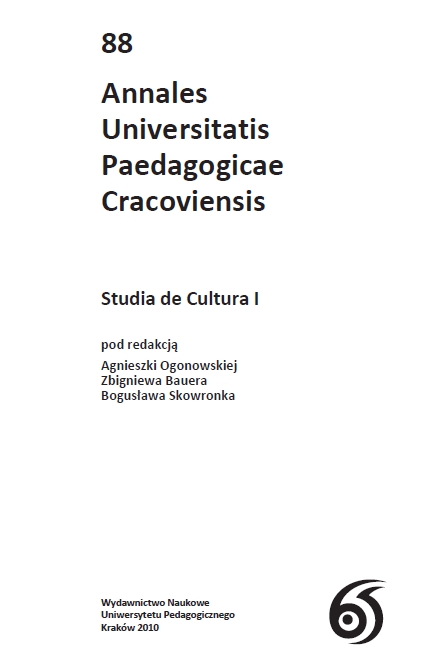Abstract
Internet - a medium or a universe?
Directions of development of modern telematic technologies (computer mediated communication, mobile telephone communication) change the human communication environment to such an extent that people treat these technologies as - in some way - an ”organic”, natural equipment of a human being. The Web, especially in its mobile version, has no longer any essential barriers. This has consequences in the way of treatment of a communication act with another person (or a group): the sense of limits and barriers, which accompanied the communication via the traditional media, disappears gradually. This article is an attempt to conceptualize this new experience, crucial in developing the anthropology of the Internet, which thus ceases to be the ”medium” and - according to the ideas of Marshall McLuhan - turns out to be an extension of the human senses.
References
Agamben G. (2006), Profanacje, przeł. M. Kwaterko, Warszawa.
View in Google Scholar
Barney D. (2008), Społeczeństwo sieci, przeł. M. Fronia, Warszawa.
View in Google Scholar
Casetti F., Odin R. (1994), Od paleo- do neo-telewizji. W perspektywie semiopragmatyki, przeł. I. Ostaszewska, [w:] Po kinie?... Audiowizualność w epoce przekaźników elektronicznych, wybór, wprowadzenie i opracowanie A. Gwóźdź, Kraków.
View in Google Scholar
Castells M. (2007), Społeczeństwo Sieci, przeł. M. Marody i in., Warszawa.
View in Google Scholar
Godlewski G. (2008), Słowo – pismo – sztuka słowa. Perspektywy antropologiczne, Warszawa.
View in Google Scholar
Hafner K. (2009), Texting May Be Taking a Toll, „New York Times”, 26.05.
View in Google Scholar
Keen A. (2007), Kult amatora. Jak Internet niszczy kulturę, przeł. M. Bernatowicz, K. Topolska-Ghariani, Warszawa.
View in Google Scholar
Krzysztofek K. (2009), Zdekodowane kody, [w:] Kody McLuhana. Topografia nowych mediów, pod red. A. Maj i M. Derdy-Nowakowskiego, Katowice.
View in Google Scholar
Miczka T. (2002), O zmianie zachowań komunikacyjnych. Konsumenci w nowych sytuacjach audiowizualnych, Katowice.
View in Google Scholar
Palfrey J. (2008), Gasser U., Born Digital: Understanding the First Generation of Digital Natives, New York.
View in Google Scholar
Renzi A. (2008), The Space of Tactical Media, [w:] M. Boler (ed.), Digital Media and Democracy. Tactics in Hard Times, Cambridge–London.
View in Google Scholar
Rose M. (1993), Parody: Ancient, Modern and Post-modern, New York.
View in Google Scholar
Turner V.W. (2006), Liminalność i communitas, przeł. E. Dżurak, [w:] Badanie kultury. Elementy teorii antropologicznej. Kontynuacje, pod red. M. Kempnego i E. Nowickiej, Warszawa.
View in Google Scholar
Zeidler-Janiszewska A. (2006), Progi i granice doświadczenia (w) współczesności, [w:] Nowoczesność jako doświadczenie, pod red. R. Nycza i A. Zeidler-Janiszewskiej, Kraków.
View in Google Scholar
Žižek S. (2001), Przekleństwo fantazji, przeł. A. Chmielewski, Wrocław.
View in Google Scholar

This work is licensed under a Creative Commons Attribution-NonCommercial 4.0 International License.
Copyright (c) 2023 Annales Universitatis Paedagogicae Cracoviensis. Studia de Cultura

